motivation动机论文
论动机的英语作文
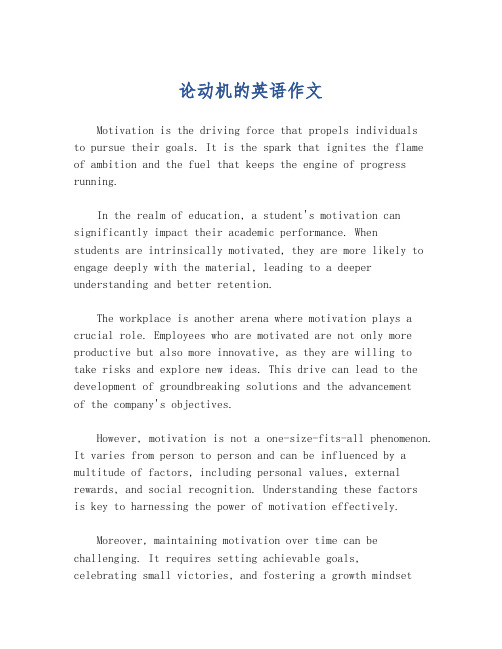
论动机的英语作文Motivation is the driving force that propels individualsto pursue their goals. It is the spark that ignites the flame of ambition and the fuel that keeps the engine of progress running.In the realm of education, a student's motivation can significantly impact their academic performance. Whenstudents are intrinsically motivated, they are more likely to engage deeply with the material, leading to a deeper understanding and better retention.The workplace is another arena where motivation plays a crucial role. Employees who are motivated are not only more productive but also more innovative, as they are willing to take risks and explore new ideas. This drive can lead to the development of groundbreaking solutions and the advancementof the company's objectives.However, motivation is not a one-size-fits-all phenomenon. It varies from person to person and can be influenced by a multitude of factors, including personal values, external rewards, and social recognition. Understanding these factorsis key to harnessing the power of motivation effectively.Moreover, maintaining motivation over time can be challenging. It requires setting achievable goals,celebrating small victories, and fostering a growth mindsetthat embraces learning from setbacks. Cultivating resilience in the face of obstacles is essential for sustaining long-term motivation.In conclusion, motivation is a multifaceted and dynamic concept that can significantly influence an individual's actions and achievements. By understanding and nurturing motivation, we can unlock our full potential and make meaningful strides towards our aspirations.。
关于学习动机和方法的四级英语作文
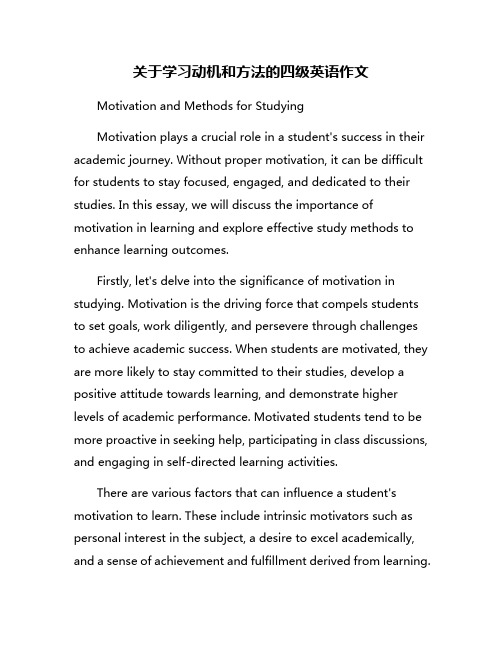
关于学习动机和方法的四级英语作文Motivation and Methods for StudyingMotivation plays a crucial role in a student's success in their academic journey. Without proper motivation, it can be difficult for students to stay focused, engaged, and dedicated to their studies. In this essay, we will discuss the importance of motivation in learning and explore effective study methods to enhance learning outcomes.Firstly, let's delve into the significance of motivation in studying. Motivation is the driving force that compels students to set goals, work diligently, and persevere through challenges to achieve academic success. When students are motivated, they are more likely to stay committed to their studies, develop a positive attitude towards learning, and demonstrate higher levels of academic performance. Motivated students tend to be more proactive in seeking help, participating in class discussions, and engaging in self-directed learning activities.There are various factors that can influence a student's motivation to learn. These include intrinsic motivators such as personal interest in the subject, a desire to excel academically, and a sense of achievement and fulfillment derived from learning.Extrinsic motivators such as rewards, praise, and recognition from teachers and parents can also play a role in motivating students to study. Additionally, a supportive learning environment, clear goals and expectations, and opportunities for autonomy and self-expression can enhance a student's motivation to learn.In addition to motivation, effective study methods are essential for maximizing learning outcomes. Utilizing appropriate study techniques can help students improve their understanding of the material, retain information better, and perform well in exams. One of the most effective study methods is active learning, which involves actively engaging with the material through activities such as summarizing the content, asking questions, and discussing key concepts with peers. This active engagement helps students process information more deeply and make meaningful connections between different concepts.Another effective study method is creating a study schedule and setting specific goals for each study session. Breaking down the material into manageable chunks and setting achievable goals can help students stay organized, focused, and motivated to study. Using mnemonic devices, such as acronyms, rhymes, orvisual imagery, can also aid in memory retention and recall of information. Additionally, practicing self-testing, such as taking practice quizzes or tests, can help students assess their understanding of the material and identify areas that require further review.Moreover, seeking help from teachers, peers, or tutors when encountering challenges or difficulties in learning can enhance the learning process. Asking questions, seeking clarification, and engaging in discussions can help students deepen their understanding of the material and overcome obstacles to learning. Collaborating with peers on group projects or study sessions can also provide opportunities for peer learning, feedback, and support.Furthermore, adopting a growth mindset, which involves believing in one's ability to learn and improve through effort and persistence, can enhance motivation and learning outcomes. Embracing challenges, viewing failures as opportunities for growth, and learning from feedback can help students develop resilience, perseverance, and a positive attitude towards learning.In conclusion, motivation and effective study methods are essential for optimizing learning outcomes and achievingacademic success. By cultivating motivation, utilizing effective study techniques, seeking help when needed, and adopting a growth mindset, students can enhance their learning experience, improve their academic performance, and achieve their educational goals. By prioritizing motivation and employing effective study methods, students can unleash their full potential and excel in their academic pursuits.。
动机重要性和方法的英语作文
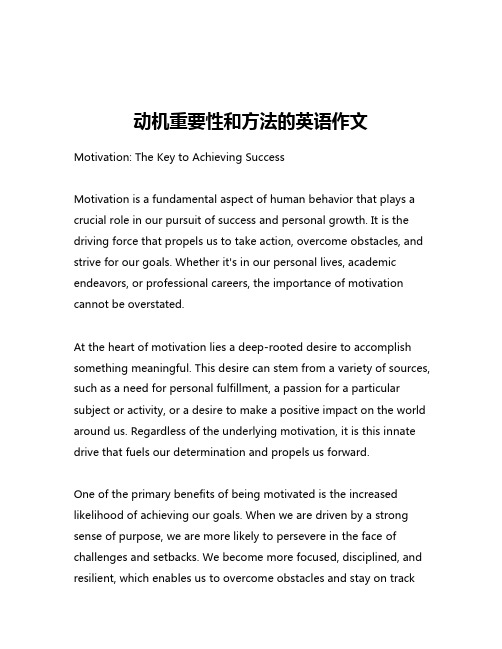
动机重要性和方法的英语作文Motivation: The Key to Achieving SuccessMotivation is a fundamental aspect of human behavior that plays a crucial role in our pursuit of success and personal growth. It is the driving force that propels us to take action, overcome obstacles, and strive for our goals. Whether it's in our personal lives, academic endeavors, or professional careers, the importance of motivation cannot be overstated.At the heart of motivation lies a deep-rooted desire to accomplish something meaningful. This desire can stem from a variety of sources, such as a need for personal fulfillment, a passion for a particular subject or activity, or a desire to make a positive impact on the world around us. Regardless of the underlying motivation, it is this innate drive that fuels our determination and propels us forward.One of the primary benefits of being motivated is the increased likelihood of achieving our goals. When we are driven by a strong sense of purpose, we are more likely to persevere in the face of challenges and setbacks. We become more focused, disciplined, and resilient, which enables us to overcome obstacles and stay on tracktowards our desired outcomes.Moreover, motivation can also have a positive impact on our overall well-being. When we are motivated, we tend to experience higher levels of energy, enthusiasm, and engagement in our daily activities. This can lead to improved mental and physical health, as well as a greater sense of satisfaction and fulfillment in our lives.However, it is important to note that motivation is not a one-size-fits-all concept. Different individuals may be motivated by different factors, and what works for one person may not necessarily work for another. Therefore, it is crucial to understand and identify the specific sources of motivation that resonate with us as individuals.One effective method for cultivating and maintaining motivation is through the setting of achievable goals. By breaking down our larger objectives into smaller, more manageable steps, we can create a sense of progress and accomplishment along the way. This can help to sustain our motivation and keep us focused on the task at hand.Another key aspect of motivation is the importance of self-reflection and introspection. By taking the time to analyze our strengths, weaknesses, and personal values, we can better understand what truly motivates us and how to harness that energy to achieve our goals.Additionally, seeking support and encouragement from others can be a powerful tool in maintaining motivation. Whether it's through the guidance of a mentor, the camaraderie of a supportive peer group, or the encouragement of loved ones, having a network of individuals who believe in us and our abilities can be a valuable source of motivation.In conclusion, the importance of motivation cannot be overstated. It is the driving force that propels us towards our goals, enhances our well-being, and enables us to overcome challenges and achieve success. By understanding the nature of motivation, cultivating it through effective strategies, and surrounding ourselves with a supportive network, we can unlock our full potential and make meaningful strides towards a fulfilling and rewarding future.。
动机和方法在学校中的重要性英语作文
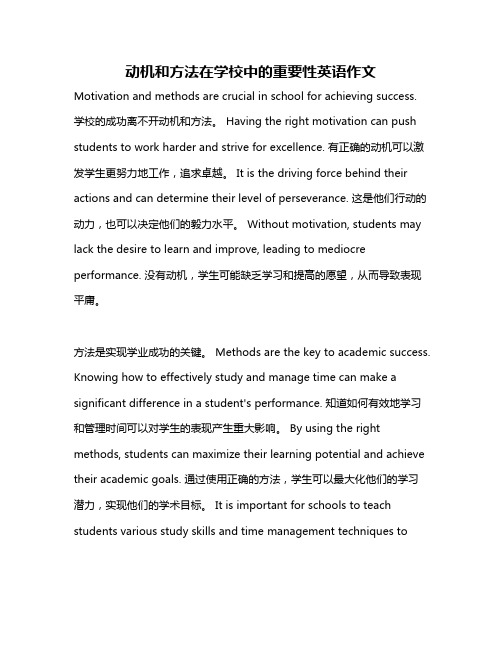
动机和方法在学校中的重要性英语作文Motivation and methods are crucial in school for achieving success. 学校的成功离不开动机和方法。
Having the right motivation can push students to work harder and strive for excellence. 有正确的动机可以激发学生更努力地工作,追求卓越。
It is the driving force behind their actions and can determine their level of perseverance. 这是他们行动的动力,也可以决定他们的毅力水平。
Without motivation, students may lack the desire to learn and improve, leading to mediocre performance. 没有动机,学生可能缺乏学习和提高的愿望,从而导致表现平庸。
方法是实现学业成功的关键。
Methods are the key to academic success. Knowing how to effectively study and manage time can make a significant difference in a student's performance. 知道如何有效地学习和管理时间可以对学生的表现产生重大影响。
By using the right methods, students can maximize their learning potential and achieve their academic goals. 通过使用正确的方法,学生可以最大化他们的学习潜力,实现他们的学术目标。
It is important for schools to teach students various study skills and time management techniques tohelp them succeed. 学校教导学生各种学习技巧和时间管理技巧对于帮助他们获得成功至关重要。
动机和学习方法的重要性,英语作文

动机和学习方法的重要性,英语作文The Importance of Motivation and Learning MethodsIntroductionMotivation and learning methods are crucial aspects of success in any educational pursuit. Motivation is the driving force behind our actions and behaviors, while learning methods determine how effectively we acquire and retain new information. In this essay, the importance of motivation and learning methods in the context of education will be discussed.Importance of MotivationMotivation is essential for maintaining focus and perseverance in the face of challenges. Without motivation, students may lack the drive to put in the necessary effort to succeed. Motivation can come from various sources, such as intrinsic desires for self-improvement or external factors like rewards and recognition.Motivation also plays a key role in shaping attitudes towards learning. Students who are motivated are more likely to have a positive outlook on education and approach new challenges with enthusiasm. This positive attitude can lead to increasedengagement in learning activities and better academic performance.Furthermore, motivation can help students set and achieve goals. By having a clear sense of purpose and direction, students can stay on track and make continuous progress towards their objectives. Motivated students are more likely to be proactive in seeking out additional resources and support to help them reach their goals.Importance of Learning MethodsLearning methods are the strategies and techniques that individuals use to acquire new knowledge and skills. The effectiveness of learning methods can have a significant impact on how well students understand and retain information. There are various learning methods that students can utilize, such as visual aids, group discussions, and hands-on activities.Choosing the right learning methods can help students engage with the material in a meaningful way. For example, visual learners may benefit from using diagrams, charts, and videos to better understand complex concepts. On the other hand, auditory learners may prefer lectures and audio recordings to reinforce their understanding of the material.Additionally, learning methods can help students develop critical thinking and problem-solving skills. By utilizing techniques such as project-based learning or case studies, students can apply theoretical knowledge to real-world situations and develop a deeper understanding of the subject matter. These practical skills are essential for success in both academic and professional settings.ConclusionIn conclusion, motivation and learning methods are essential components of academic success. Motivation provides the drive and perseverance needed to overcome obstacles and achieve goals, while learning methods help students effectively acquire and retain new information. By cultivating a strong sense of motivation and utilizing appropriate learning methods, students can enhance their learning experience and reach their full potential.。
动机和方法的重要性英语范文
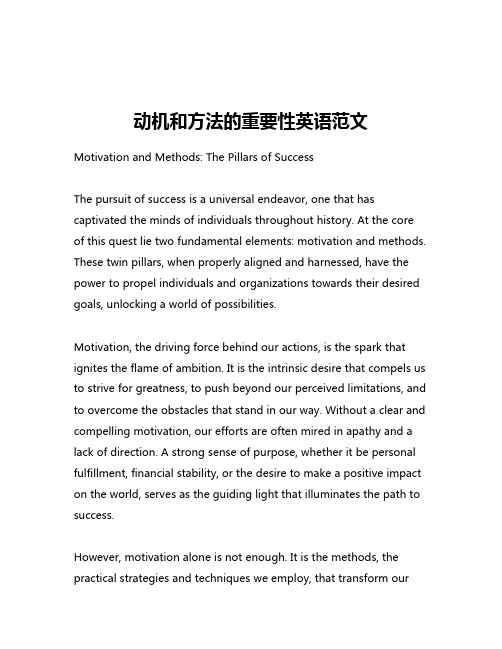
动机和方法的重要性英语范文Motivation and Methods: The Pillars of SuccessThe pursuit of success is a universal endeavor, one that has captivated the minds of individuals throughout history. At the core of this quest lie two fundamental elements: motivation and methods. These twin pillars, when properly aligned and harnessed, have the power to propel individuals and organizations towards their desired goals, unlocking a world of possibilities.Motivation, the driving force behind our actions, is the spark that ignites the flame of ambition. It is the intrinsic desire that compels us to strive for greatness, to push beyond our perceived limitations, and to overcome the obstacles that stand in our way. Without a clear and compelling motivation, our efforts are often mired in apathy and a lack of direction. A strong sense of purpose, whether it be personal fulfillment, financial stability, or the desire to make a positive impact on the world, serves as the guiding light that illuminates the path to success.However, motivation alone is not enough. It is the methods, the practical strategies and techniques we employ, that transform ouraspirations into tangible achievements. Effective methods provide the structure, the discipline, and the tools necessary to translate our dreams into reality. Whether it's developing a comprehensive action plan, honing our skills through deliberate practice, or leveraging the power of technology, the right methods can amplify our efforts and increase the likelihood of success.One of the key aspects of effective methods is the ability to adapt and evolve. In a constantly changing world, rigid and inflexible approaches often fall short. Successful individuals and organizations recognize the importance of continuous learning, experimentation, and the willingness to embrace new and innovative ways of doing things. By constantly refining and improving their methods, they are better equipped to navigate the ever-shifting landscape of challenges and opportunities.Moreover, the synergy between motivation and methods is paramount. When these two elements are aligned and working in harmony, the results can be truly extraordinary. A strong motivation provides the driving force, while well-crafted methods offer the roadmap and the tools to turn that motivation into tangible progress. This symbiotic relationship is the hallmark of high-achieving individuals and organizations, who are able to consistently deliver remarkable outcomes.It is important to note that the specific motivations and methods may vary from person to person, or from organization to organization. What works for one individual may not necessarily work for another. The key is to explore, experiment, and find the unique combination that resonates with one's own aspirations and strengths.In conclusion, the importance of motivation and methods cannot be overstated. These two pillars, when properly understood and harnessed, have the power to transform lives, businesses, and entire communities. By cultivating a deep sense of purpose and pairing it with strategic, adaptable methods, individuals and organizations can unlock their full potential and achieve remarkable feats. As we navigate the complexities of the modern world, let us embrace the power of motivation and methods, and embark on a journey of lasting success.。
关于motivation的英文文章

Motivation is one of the most important factors that drive individuals to achieve their goals and succeed in their endeavors. It epasses the various internal and external forces that initiate and sust本人n goal-directed behavior. In the following article, we will delve into the concept of motivation, its different types, and the various factors that influence it.1. Definition of Motivation- Motivation can be defined as the process that initiates, guides, and m本人nt本人ns goal-oriented behavior. It is the driving force behind our actions, influencing our willingness to exert effort and persevere in the face of obstacles.- Motivation can also be viewed as the energizing force that activates behavior and provides direction and purpose to our actions.2. Types of Motivation- Intrinsic Motivation: This type of motivation refers to engaging in an activity for its inherent satisfaction, rather than for some external reward or avoidance of punishment. Individuals who are intrinsically motivated are driven by their personal interests, enjoyment, or sense of aplishment.- Extrinsic Motivation: Extrinsic motivation, on the other hand,involves engaging in an activity in order to earn a reward or avoid a punishment. This type of motivation is often driven by external factors such as incentives, recognition, or social approval.- Amotivation: Amotivation refers to the absence of motivation. Individuals who are amotivated lack the desire to engage in goal-directed behavior and may feel apathetic or indifferent towards their pursuits.3. Factors Affecting Motivation- Individual Differences: People differ in their levels of motivation due to individual factors such as personality tr本人ts, beliefs, values, and needs. For example, individuals with a high need for achievement may be more motivated to pursue challenging goals.- Environmental Factors: The environment in which individuals operate can have a significant impact on their motivation. Supportive and nurturing environments can enhance motivation, while negative or restrictive environments can diminish it.- Goal Characteristics: The nature of the goals individuals are pursuing can also influence their motivation. Clear, challenging, and personally meaningful goals are more likely to elicit high levels of motivation.4. The Importance of Motivation- Motivation plays a crucial role in driving individuals towards achieving their goals and realizing their potential. It sust本人ns effort over time and helps individuals ovee obstacles and setbacks.- Motivation is also integral to the performance of individuals in various dom本人ns, including education, work, sports, and personal development. Highly motivated individuals are more likely to exhibit persistence, resilience, and a willingness to put in the effort required to succeed.- In organizational settings, motivation is essential for enhancing employee engagement, productivity, and job satisfaction. It can lead to higher levels of performance and overall success for the organization.5. Strategies for Enhancing Motivation- Set Clear and Att本人nable Goals: Establishing specific, challenging, and achievable goals can enhance motivation by providing individuals with a clear sense of direction and purpose.- Provide Feedback and Recognition: Regular feedback and recognition for achievements can bolster motivation bysignaling progress and reinforcing desired behaviors.- Foster a Supportive Environment: Creating an environment that is supportive, encouraging, and conducive to growth can help to sust本人n motivation and foster a sense of belonging andpetence.In conclusion, motivation is a multifaceted concept that influences our behaviors, drives us towards our goals, and sust 本人ns our efforts over time. Understanding the different types of motivation and the factors that influence it can help individuals and organizations cultivate an environment that fosters high levels of motivation and achievement. By recognizing the importance of motivation and implementing strategies to enhance it, individuals can optimize their potential and work towards realizing their aspirations.。
学习的动机和重要性的英文作文

学习的动机和重要性的英文作文英文回答:Motivation and the Importance of Learning.Motivation is a driving force that compels people to act, learn, and achieve goals. It is the desire to know, understand, and improve. Without motivation, learning becomes a laborious and unfulfilling task. There arevarious types of motivation, including intrinsic motivation, which stems from within an individual, and extrinsic motivation, which comes from external factors such as rewards or punishments.Intrinsic motivation is often considered the most powerful type of motivation as it is driven by anindividual's inherent curiosity, interest, and enjoyment in a subject. When students are intrinsically motivated, they are more likely to engage in deep and meaningful learning, as they are driven by a desire to understand and master thematerial. Extrinsic motivation, on the other hand, can also be effective in driving learning, but it tends to be less sustainable as it is contingent on external factors.The importance of learning cannot be overstated. Learning is essential for personal growth, intellectual development, and lifelong success. Through learning, we acquire knowledge, skills, and abilities that empower us to navigate the complexities of life, make informed decisions, and contribute positively to our communities. Learning encompasses a wide range of activities, from formal education to informal experiences such as reading, traveling, and engaging in hobbies.In a rapidly changing world, where technological advancements and the globalization of knowledge are transforming the job market and our daily lives, the importance of lifelong learning has become more critical than ever before. Continuous learning enables us to adapt to new challenges, acquire new skills, and remain competitive in an evolving job market. Moreover, learning fosters creativity, problem-solving abilities, andresilience, qualities that are essential for success in both personal and professional endeavors.Learning also plays a vital role in promoting social cohesion and cross-cultural understanding. By learning about different cultures, traditions, and perspectives, we gain empathy and tolerance, breaking down barriers and fostering mutual respect. Learning promotes critical thinking and the ability to evaluate information objectively, equipping us to make informed decisions and participate effectively in democratic societies.In conclusion, motivation is the driving force that fuels learning, and learning is essential for personal growth, intellectual development, lifelong success, and the betterment of society. Whether driven by intrinsiccuriosity or external incentives, motivation is the key to unlocking the transformative power of learning. By embracing a lifelong commitment to learning, we empower ourselves to thrive in an ever-changing world, contribute to our communities, and lead fulfilling and meaningful lives.中文回答:学习的动机。
动机和方法的重要性英语作文四级
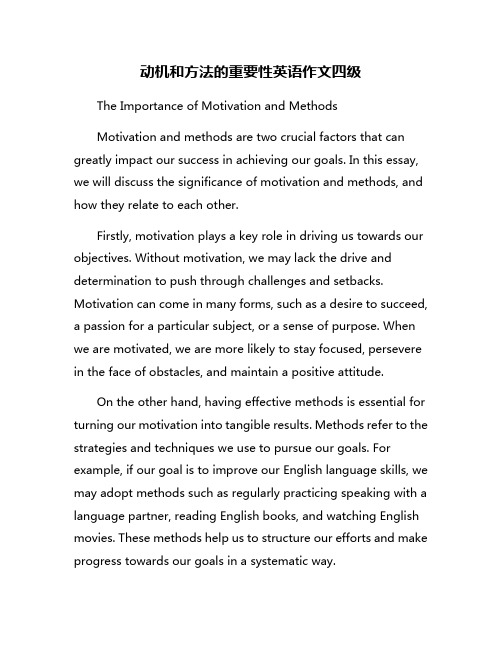
动机和方法的重要性英语作文四级The Importance of Motivation and MethodsMotivation and methods are two crucial factors that can greatly impact our success in achieving our goals. In this essay, we will discuss the significance of motivation and methods, and how they relate to each other.Firstly, motivation plays a key role in driving us towards our objectives. Without motivation, we may lack the drive and determination to push through challenges and setbacks. Motivation can come in many forms, such as a desire to succeed, a passion for a particular subject, or a sense of purpose. When we are motivated, we are more likely to stay focused, persevere in the face of obstacles, and maintain a positive attitude.On the other hand, having effective methods is essential for turning our motivation into tangible results. Methods refer to the strategies and techniques we use to pursue our goals. For example, if our goal is to improve our English language skills, we may adopt methods such as regularly practicing speaking with a language partner, reading English books, and watching English movies. These methods help us to structure our efforts and make progress towards our goals in a systematic way.Furthermore, the relationship between motivation and methods is interdependent. Motivation provides the energy and drive to pursue our goals, while methods help us channel that energy in a focused and productive manner. In other words, motivation without effective methods may lead to wasted efforts, while methods without motivation may lack the necessary drive to sustain progress.In order to maximize our success, it is crucial to align our motivation with suitable methods. This means understanding what motivates us and selecting methods that are in line with our strengths, interests, and objectives. For example, if we are motivated by a desire to help others, we may choose methods that involve volunteering or community service. By choosing methods that resonate with our values and aspirations, we are more likely to stay committed and engaged in the pursuit of our goals.In conclusion, motivation and methods are key components of success in any endeavor. By cultivating a strong sense of motivation and pairing it with effective methods, we can increase our chances of achieving our goals and realizing our full potential. It is important to recognize the importance of bothmotivation and methods, and to strive for a harmonious balance between the two in our pursuit of success.。
动机重要性英语作文
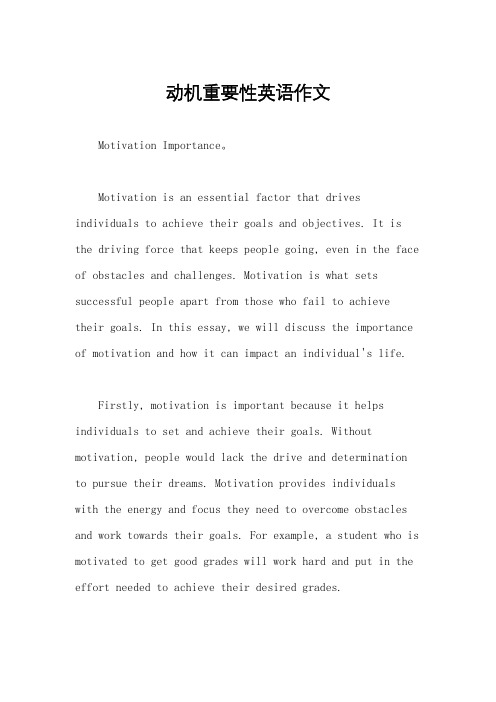
动机重要性英语作文Motivation Importance。
Motivation is an essential factor that drives individuals to achieve their goals and objectives. It is the driving force that keeps people going, even in the face of obstacles and challenges. Motivation is what sets successful people apart from those who fail to achievetheir goals. In this essay, we will discuss the importance of motivation and how it can impact an individual's life.Firstly, motivation is important because it helps individuals to set and achieve their goals. Without motivation, people would lack the drive and determination to pursue their dreams. Motivation provides individuals with the energy and focus they need to overcome obstacles and work towards their goals. For example, a student who is motivated to get good grades will work hard and put in the effort needed to achieve their desired grades.Secondly, motivation is important because it helps individuals to improve their performance. When individuals are motivated, they are more likely to put in the necessary effort to improve their skills and abilities. This can lead to better performance in various areas of life, such as work, sports, and academics. For example, an athlete who is motivated to win a competition will train harder and push themselves to perform better.Thirdly, motivation is important because it helps individuals to maintain a positive attitude. When individuals are motivated, they are more likely to have a positive outlook on life. This can help them to deal with challenges and setbacks in a more constructive way. For example, a person who is motivated to lose weight will maintain a positive attitude even when facing setbacks, such as a plateau in weight loss.Fourthly, motivation is important because it helps individuals to build self-confidence. When individuals are motivated, they are more likely to believe in theirabilities and have confidence in themselves. This can helpthem to take on new challenges and pursue their goals with greater confidence. For example, a person who is motivated to start their own business will have the confidence to take risks and make decisions.In conclusion, motivation is an essential factor that can have a significant impact on an individual's life. It helps individuals to set and achieve their goals, improve their performance, maintain a positive attitude, and build self-confidence. Therefore, it is important for individuals to find ways to stay motivated and to cultivate a positive mindset. By doing so, they can achieve success and happiness in various areas of their lives.。
动机和方法的重要性六级英语作文

动机和方法的重要性六级英语作文英文回答:Importance of Motivation and Methodology.Motivation and methodology play pivotal roles in shaping the outcomes of any endeavor. Motivation, the driving force behind our actions, fuels our determination and sustains our efforts. Methodology, the systematic approach to achieving a goal, provides a roadmap for our actions and helps us navigate challenges. Together, motivation and methodology form an indispensable duo, significantly enhancing our chances of success.Motivation encompasses both intrinsic and extrinsic factors. Intrinsic motivation arises from within, driven by our passions, interests, and values. It fuels our desire to engage in activities that bring us fulfillment and personal growth. Extrinsic motivation, on the other hand, stems from external rewards or consequences and can be helpful inachieving specific goals. A balanced approach to motivation, drawing upon both intrinsic and extrinsic sources, can create a powerful synergy that sustains our efforts overthe long term.Methodology refers to the systematic approach and techniques we employ to achieve our objectives. It involves planning, organizing, and executing a course of actionbased on sound principles and evidence. Effective methodology begins with clearly defined goals and objectives, providing us with a clear direction to follow.It incorporates evidence-based practices, ensuring that our actions are grounded in what is known to work. Flexibility and adaptability are also essential aspects of methodology, allowing us to make adjustments as new information or circumstances arise.The importance of motivation and methodology is evident in various spheres of life. In academia, students with high levels of motivation demonstrate greater academic achievement, perseverance in the face of setbacks, and a positive attitude towards learning. In the workplace,motivated employees are more productive, innovative, and committed to their organizations. In personal endeavors, individuals with clear motivations and effective methodologies are more likely to attain their goals,whether it is improving their health, pursuing a passion,or making a meaningful contribution to society.Striking a balance between motivation and methodologyis crucial for optimal performance. Strong motivation provides the impetus to initiate and sustain our efforts, while a well-defined methodology ensures that our actions are focused and efficient. By harnessing the power of both motivation and methodology, we can maximize our potential and achieve greater success in our endeavors.中文回答:动力和方法的重要性。
motivation英文作文

motivation英文作文英文回答:Motivation is a complex and multifaceted concept that has been studied by philosophers, psychologists, and scientists for centuries. There is no single definition of motivation, but it is generally understood to be theinternal drive that compels us to act. Motivation can be either intrinsic or extrinsic. Intrinsic motivation comes from within, and is driven by our own interests and desires. Extrinsic motivation comes from outside of us, and isdriven by rewards or punishments.There are many different theories of motivation, eachof which attempts to explain how motivation works. Some of the most well-known theories include:Maslow's Hierarchy of Needs: This theory suggests that humans have a hierarchy of needs, and that we are motivated to satisfy our needs in a particular order. The most basicneeds, such as food and shelter, must be met before we can move on to higher-level needs, such as self-esteem andself-actualization.Herzberg's Two-Factor Theory: This theory suggeststhat there are two types of factors that motivate employees: hygiene factors and motivators. Hygiene factors are factors that prevent dissatisfaction, such as salary and working conditions. Motivators are factors that lead to satisfaction, such as recognition and achievement.Vroom's Expectancy Theory: This theory suggests that motivation is determined by three factors: expectancy, instrumentality, and valence. Expectancy is the belief that effort will lead to performance. Instrumentality is the belief that performance will lead to rewards. Valence isthe value that we place on the rewards.Motivation is essential for success. It is what drives us to set goals, work hard, and achieve our potential. When we are motivated, we are more likely to be productive, creative, and successful.中文回答:动机是一个复杂且多方面的概念,几个世纪以来一直受到哲学家、心理学家和科学家的研究。
动机重要性和方法的英语作文

动机重要性和方法的英语作文English Answer:In the pursuit of any endeavor, the significance of motivation and methodology cannot be overstated. Motivation provides the driving force that propels us forward, while methodology offers the framework that guides our actions. Both are indispensable elements in the path to success.Motivation, derived from Latin origin meaning "to move," is the psychological process that initiates and sustains goal-directed behavior. It encompasses both intrinsic and extrinsic motivators. Intrinsic motivation arises from within the individual, driven by personal interest, curiosity, or a sense of purpose. Extrinsic motivation, on the other hand, originates from external sources, such as rewards, punishments, or social recognition.The power of motivation should not be underestimated.It has the ability to ignite passion, foster perseverance, and overcome obstacles. Motivated individuals are more likely to engage in challenging tasks, dedicate extended effort, and strive for excellence. They are also better equipped to handle setbacks, as their intrinsic drive provides a strong foundation upon which to rebuild.Methodology, on the other hand, refers to the systematic approach employed to achieve a desired outcome. It consists of a well-defined sequence of steps or procedures that provide a roadmap for action. By following a methodology, individuals can ensure a consistent and efficient approach, minimizing the risk of arbitrary or haphazard actions.In the context of goal achievement, a well-crafted methodology serves as a guiding light. It breaks down complex tasks into manageable steps, making them seem less daunting and more achievable. By providing a structured framework, methodologies help individuals prioritize tasks, track progress, and troubleshoot potential issues. They also reduce the likelihood of duplication or wasted effort,maximizing the efficiency of the process.The importance of motivation and methodology is undeniable. They are two sides of the same coin, eachplaying a complementary role in the pursuit of success. For those seeking to achieve their goals, it is essential to cultivate both intrinsic and extrinsic motivation, while adopting a systematic methodology that provides a clearpath forward.中文回答:动机的重要性:动机是推动我们采取行动的心理过程。
学习动机可行性分析范文
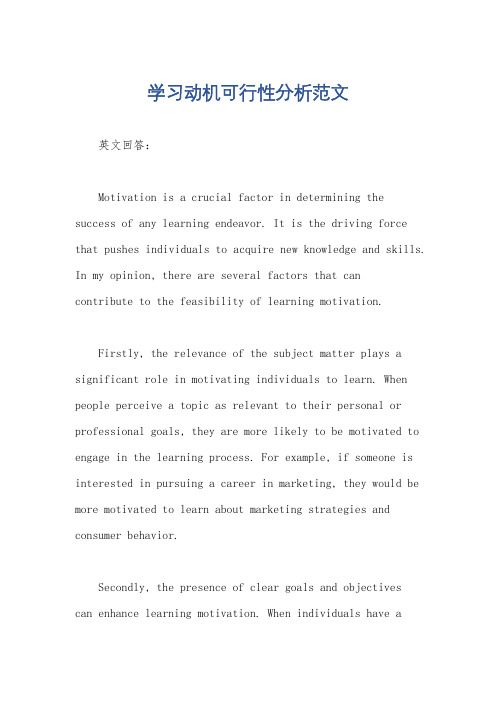
学习动机可行性分析范文英文回答:Motivation is a crucial factor in determining the success of any learning endeavor. It is the driving force that pushes individuals to acquire new knowledge and skills. In my opinion, there are several factors that cancontribute to the feasibility of learning motivation.Firstly, the relevance of the subject matter plays a significant role in motivating individuals to learn. When people perceive a topic as relevant to their personal or professional goals, they are more likely to be motivated to engage in the learning process. For example, if someone is interested in pursuing a career in marketing, they would be more motivated to learn about marketing strategies and consumer behavior.Secondly, the presence of clear goals and objectivescan enhance learning motivation. When individuals have aclear understanding of what they want to achieve through their learning efforts, they are more likely to stay focused and motivated. For instance, if someone sets a goal to learn a new language in order to communicate with their foreign colleagues, they would be motivated to consistently practice and improve their language skills.Additionally, the learning environment can also influence motivation. A supportive and encouraging learning environment can foster motivation by providing individuals with positive feedback and opportunities for growth. Conversely, a negative or competitive learning environment can hinder motivation. For example, if a student feels constantly criticized or compared to others in a classroom setting, their motivation to learn may decrease.Furthermore, the presence of intrinsic motivation, which stems from internal factors such as curiosity and personal interest, can greatly contribute to thefeasibility of learning motivation. When individuals are genuinely interested in a subject, they are more likely to be motivated to explore and understand it. For instance, ifsomeone has a passion for history, they would be motivatedto read books, watch documentaries, and engage in discussions about historical events.In conclusion, the feasibility of learning motivation can be influenced by various factors such as the relevanceof the subject matter, clear goals and objectives, the learning environment, and intrinsic motivation. When these factors align, individuals are more likely to be motivatedto engage in the learning process and achieve their desired outcomes.中文回答:学习动机是决定学习成功与否的关键因素。
动机对事情产生的影响作文
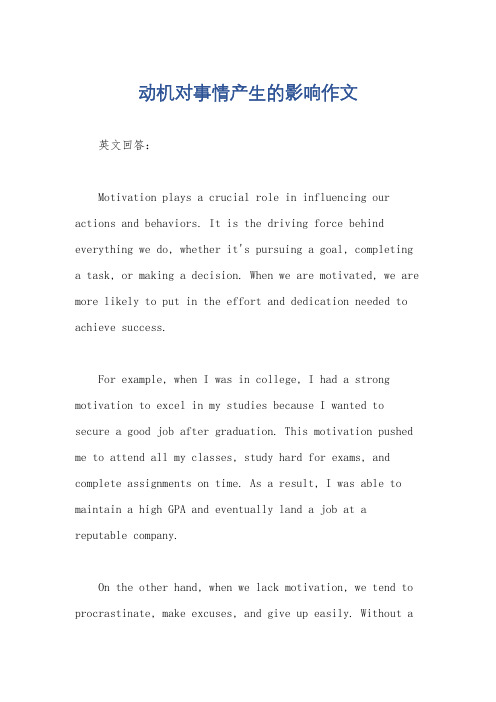
动机对事情产生的影响作文英文回答:Motivation plays a crucial role in influencing our actions and behaviors. It is the driving force behind everything we do, whether it's pursuing a goal, completing a task, or making a decision. When we are motivated, we are more likely to put in the effort and dedication needed to achieve success.For example, when I was in college, I had a strong motivation to excel in my studies because I wanted to secure a good job after graduation. This motivation pushed me to attend all my classes, study hard for exams, and complete assignments on time. As a result, I was able to maintain a high GPA and eventually land a job at a reputable company.On the other hand, when we lack motivation, we tend to procrastinate, make excuses, and give up easily. Without astrong reason to act, it becomes difficult to stay focused and committed to our goals. For instance, there was a time when I wanted to start a blog but struggled to find the motivation to write consistently. As a result, my blog never gained traction and eventually fizzled out.In conclusion, motivation is a powerful force that can drive us to achieve great things. Whether it's pursuing a career, starting a business, or learning a new skill, having a strong motivation can make all the difference in our success. It is important to identify what motivates us and use that as fuel to propel us towards our goals.中文回答:动机在影响我们的行为和行动方面起着至关重要的作用。
动力和动机的关系英语作文
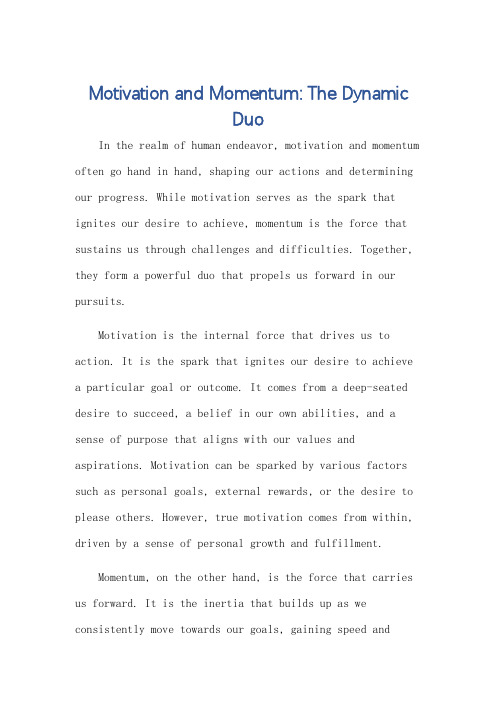
Motivation and Momentum: The DynamicDuoIn the realm of human endeavor, motivation and momentum often go hand in hand, shaping our actions and determining our progress. While motivation serves as the spark that ignites our desire to achieve, momentum is the force that sustains us through challenges and difficulties. Together, they form a powerful duo that propels us forward in our pursuits.Motivation is the internal force that drives us to action. It is the spark that ignites our desire to achieve a particular goal or outcome. It comes from a deep-seated desire to succeed, a belief in our own abilities, and a sense of purpose that aligns with our values and aspirations. Motivation can be sparked by various factors such as personal goals, external rewards, or the desire to please others. However, true motivation comes from within, driven by a sense of personal growth and fulfillment.Momentum, on the other hand, is the force that carries us forward. It is the inertia that builds up as we consistently move towards our goals, gaining speed andtraction. Momentum is created through consistent action and effort. It is the result of staying focused, staying committed, and staying the course despite obstacles and setbacks. Momentum is contagious, and it can be felt by others, inspiring them to join the cause and contribute to the shared goal.The relationship between motivation and momentum is symbiotic. Motivation provides the initial spark that gets us started, while momentum sustains us through the challenges and difficulties that lie ahead. Without motivation, it can be difficult to get started or maintain the necessary effort. However, without momentum, even the most motivated individual may find it challenging to sustain their efforts over the long haul.In order to harness the power of motivation and momentum, it is important to align our goals with our values and aspirations. This ensures that we are intrinsically motivated to achieve them, and that the process itself is fulfilling and rewarding. Additionally, setting clear and specific goals helps us to stay focused and measure our progress. Regularly reflecting on ourprogress and celebrating our achievements can also help to maintain momentum and keep us motivated.In conclusion, motivation and momentum are two critical components of success. Motivation ignites our desire to achieve, while momentum sustains us through challenges and difficulties. By aligning our goals with our values,setting clear targets, and celebrating our achievements, we can harness the power of this dynamic duo and achieve remarkable things.**动力与动量:强大的组合**在人类努力的领域中,动力和动量常常携手并进,塑造我们的行动并决定我们的进步。
写作动机的重要性英语作文

写作动机的重要性英语作文Having a strong motivation is crucial for achieving success in any endeavor. It is the driving force that pushes us to overcome obstacles, work hard, and stay committed to our goals.Motivation gives us the energy and determination to pursue our dreams, even when faced with challenges and setbacks. Without it, we may easily give up when things get tough, and never reach our full potential.When we are motivated, we are more focused and productive. We are willing to put in the effort and time needed to accomplish our tasks, and we are more likely to stay persistent in the face of adversity.A strong motivation also helps us to stay positive and optimistic. It gives us the strength to keep going, even when things seem impossible or hopeless. It allows us to believe in ourselves and our abilities, and to keep pushingforward towards our goals.Furthermore, motivation is essential for personal growth and development. It encourages us to step out of our comfort zone, take risks, and learn new things. It inspires us to challenge ourselves and strive for excellence in everything we do.In conclusion, motivation is the key to success. It fuels our passion, determination, and resilience, and empowers us to achieve great things. Without it, we would lack the drive and enthusiasm needed to pursue our ambitions and make our dreams a reality.。
self motivated作文
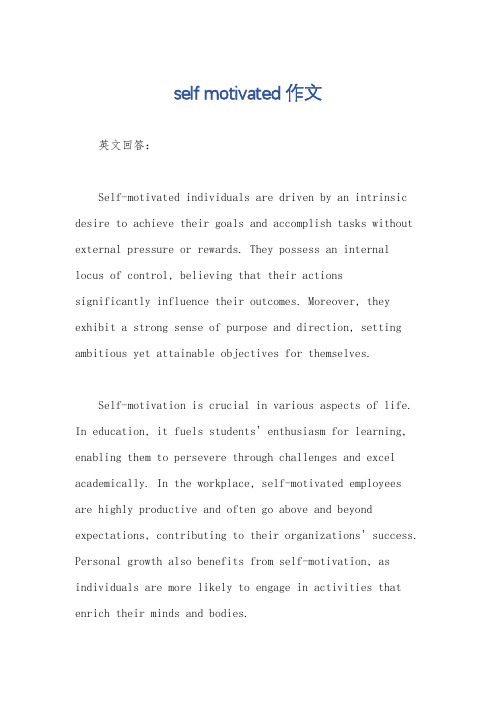
self motivated作文英文回答:Self-motivated individuals are driven by an intrinsic desire to achieve their goals and accomplish tasks without external pressure or rewards. They possess an internal locus of control, believing that their actionssignificantly influence their outcomes. Moreover, they exhibit a strong sense of purpose and direction, setting ambitious yet attainable objectives for themselves.Self-motivation is crucial in various aspects of life. In education, it fuels students' enthusiasm for learning, enabling them to persevere through challenges and excel academically. In the workplace, self-motivated employees are highly productive and often go above and beyond expectations, contributing to their organizations' success. Personal growth also benefits from self-motivation, as individuals are more likely to engage in activities that enrich their minds and bodies.Several factors contribute to self-motivation.Intrinsic motivation, stemming from an individual'sinherent enjoyment or interest in an activity, is a key factor. Curiosity, passion, and a desire for self-improvement can all serve as intrinsic motivators.Extrinsic motivation, derived from external rewards or recognition, can also play a role. However, intrinsic motivation tends to be more sustainable and conducive to long-term success.Cultivating self-motivation involves developing strategies to maintain focus, set achievable goals, and reward oneself for accomplishments. Breaking down large tasks into smaller, manageable ones can make them less daunting. Setting realistic goals with clear timelines provides a sense of accomplishment and boosts motivation. Acknowledging and celebrating successes, both big and small, reinforces positive behavior and fosters a sense of self-efficacy.Self-motivated individuals are highly effective anddriven to succeed. They possess a strong sense of purpose, intrinsic motivation, and a positive attitude. By embracing self-motivation, individuals can achieve their fullpotential and live fulfilling lives.中文回答:自驱型的人是由内在的愿望而驱使的,他们在没有外力或奖励的情况下就能实现自己的目标并完成任务。
动机的作文
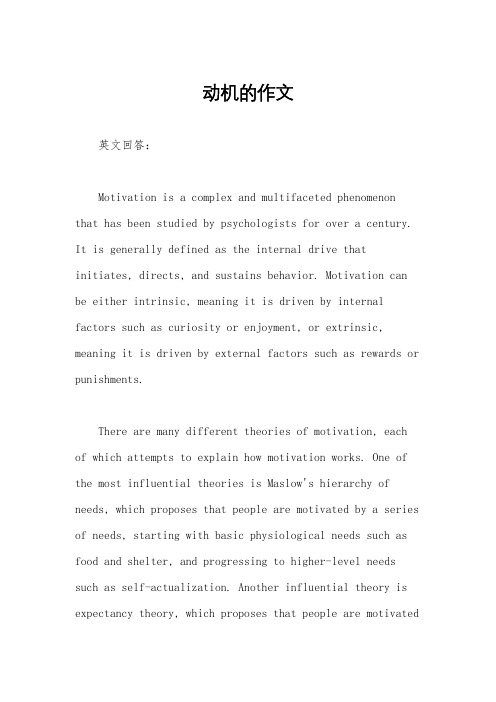
动机的作文英文回答:Motivation is a complex and multifaceted phenomenonthat has been studied by psychologists for over a century. It is generally defined as the internal drive that initiates, directs, and sustains behavior. Motivation can be either intrinsic, meaning it is driven by internal factors such as curiosity or enjoyment, or extrinsic, meaning it is driven by external factors such as rewards or punishments.There are many different theories of motivation, each of which attempts to explain how motivation works. One of the most influential theories is Maslow's hierarchy of needs, which proposes that people are motivated by a series of needs, starting with basic physiological needs such as food and shelter, and progressing to higher-level needs such as self-actualization. Another influential theory is expectancy theory, which proposes that people are motivatedto engage in behaviors that they expect will lead to desirable outcomes.Motivation is essential for success in all areas of life. It is what drives us to set goals, work hard, and overcome challenges. Without motivation, we would simply drift through life, never achieving our full potential.There are many things that you can do to increase your motivation. One important thing is to set clear and achievable goals. When you know what you are working towards, it is easier to stay motivated and focused. Another important thing is to find activities that you enjoy and that you are passionate about. When you are engaged in activities that you enjoy, you are more likely to be intrinsically motivated to continue.Finally, it is important to surround yourself with positive and supportive people. When you are surrounded by people who believe in you and who encourage you, it is easier to stay motivated and to achieve your goals.中文回答:动机是一种复杂且多方面的现象,一个多世纪以来一直受到心理学家们的研究。
- 1、下载文档前请自行甄别文档内容的完整性,平台不提供额外的编辑、内容补充、找答案等附加服务。
- 2、"仅部分预览"的文档,不可在线预览部分如存在完整性等问题,可反馈申请退款(可完整预览的文档不适用该条件!)。
- 3、如文档侵犯您的权益,请联系客服反馈,我们会尽快为您处理(人工客服工作时间:9:00-18:30)。
Motivation in Second Language Learning and English TeachingAbstractIt is believed that individual learner variables influence learning outcomes. The variables have been categorized into cognitive variables, affective variables and personality variables. Of affective variables, motivation has been thought to play a most important role in L2 learning. Therefore, a further study o f motivation can really help a lot in English teaching. The article states the information of motivation and its influence on English language teaching.Key words: motivation; second language learning; English teachingFrom the second half of the twentieth century on, researchers have begun to analyze child language learning systematically. They have attempted to discover the nature of the psycholinguistic process that enables every human being to gain great control of an exceedingly complex system of communication.Learning outcomes may be influenced by individual learner variables. The motivation of learning plays very important role in second language learning. A language teacher should get the intimate knowledge about the categories of motivation, which will help to conduct a well arranged language teaching.1. Second Language LearningAs the global society in which we live flows more easily across state borders, our people, cultures, companies, governments, and institutions from around the world have more contact. Borders are blurred and the importance of bi-and multi-lingualism becomes necessary to sustain this constant contact. As a result of this increase in language learning and teaching, much research has been devoted to exploring ways in which a diverse set of factors affects learning and acquisition. The significance of these variables lies in the impact on how we teach second languages. In a where barriers to inter-cultural and inter - lingual interaction are being torn down, this research will have a great impact on its future. Our world has become more globleleaving fewer realms to exist in state boundaries and expanding the number of activities involving different cultures and languages. Migration, inter-language marriages, bilingual education, multi-national corporations and international organizations are just a few phenomena on the rise that require bilingual or multi-lingual participants. This trend has in turn spawned research into two overlapping areas: initial language acquisition in young children and that on acquisition of second language.The most important factor affecting initial language acquisition is neurological developments in the brain. Children can also have some characteristics that aid in rapid acquisition. They are unselfconscious, learn clear positive advantages associated with successful communication, and have no other language to fall back on. These types of advantages play a role in how fast and well children acquire language.In second language acquisition and learning the similar factors determine whether or not the language is acquired or learned at all. While initial language acquisition relies mainly on neurological development over time, second language acquisition and learning rely on age only in associated characteristics and not in actual brain structure. More relevant to second language learning are four other factors: motivation, opportunity, environment, and personality. In this paper, I will turn to motivation in detail.2. Concept of motivationThe analysis of social context makes it possible to focus on the individual learner and ask how social effects are carried into language learning. The first connection is in the development of motivation. According to Carroll, the more motivation a learner has, the more time he or she will spend learning an aspect of a second language. To be more specific about motivation, three questions arise: Where does motivation come from? Is there one kind of motivation, or more? What parts of second language learning does motivation (of what kind) influence? In one of the earliest statements on motivation in second language learning, Gardner and Lambert suggested that individuals’motivation to learn a second language is controlled by his attitudes towards the other group in particular and by his orientation to the learning task itself.Of all school subjects, language learning is the one where attitude is specially relevant: Gardner points out that:Language courses are different from other curriculum topics. They require that the individual incorporates elements from another culture. As a consequence, reactions to the other culture become important considerations. Motivation is commonly thought of as an inner drive or desire that moves one to a particular action. Some researchers hold that certain motivational anthropological constants do exist. These include:1. need for exploration ( curiosity)2. need for manipulating or controlling the environment3. need for activity4. need for stimulation5. need for knowledge6. need for ego-enhancementMotivation is a complex structure, defined by three main components: desire to achieve a goal, effort extended in this direction, and satisfaction with the task.3. Types of MotivationMotivation in L 2 learning has chiefly been used to refer to the long-term fairly stable attitudes in the students’ minds. Gardner and Lambert have introduced two types of favorable motivation. A person’s motivation behind learning a second language and the views he holds regarding the L 2- speaking community both come into play in speed of SLA and degree of proficiency achieved.Motivation is differentiated a long a continuum integrative at one end and instrumental at another. The more that a student admires the target culture reads its literature, visits it on holiday, looks for opportunities to practice the language, and so on the more successful the student will be in the L2 classroom. Motivation has been identified as the learners’orientation with regard to the goal of learning a second language. It is thought that students who are most successful when learning a target language are those who like the people that speak the language, admire the culture and have a desire to become familiar with or even integrate into the society in whichthe language is used. T his form of motivation is known integrative motivation. When some one becomes a resident in a new community that uses the target language in its social interact ions, integrative motivation is a key component in assisting the learner to develop some level of proficiency in the language. It is also theorized that integrative motivation typically underlies successful acquisition of a wide range of registers and a native like pronunciation.In contrast to integrative motivation is the form of motivation referred to as instrumental motivation. Instrumental motivation means learning the language for an ulterior motive unrelated to its use by native speakers. This is generally characterized by the desire to obtain some thing practical or concrete from the study of a second language. With instrumental motivation the purpose of language acquisition is more utilitarian. Instrumental motivation is often characteristic of second language acquisition, where little or no social integration of the learner into a community using the target language takes p lace, or in some instances is even desired.While both integrative and instrumental motivation are essential elements of success, it is integrative motivation which has been found to sustain long term success when learning a second language. In some of the early research conducted by Gardner and Lambert integrative motivation was viewed as being of more importance in a formal learning environment than instrumental motivation. In later studies, integrative motivation has continued to be emphasized, although now the importance of instrumental motivation is also stressed. However, it is important to note that instrumental motivation has only been acknowledged as a significant factor in some research, whereas integrative motivation is continually linked to successful second language acquisition. It has been found that generally students select instrumental reasons more frequently than integrative reasons for the study of language. Those who do support an integrative approach to language study are usually more highly motivated and overall more successful in language learning. One area where instrumental motivation can prove to be successful is in the situation where the learner is provided with an opportunity to use the target language and therefore, no chance to interact with members of the target group. Brown makes the point that bothintegrative and instrumental motivations are not necessarily mutually exclusive. Learners rarely select one form of motivation when learning a second language, but rather a combination of both orientations. Motivation is an important factor in L 2 achievement. For this reason it is important to identify both the type and combination of motivation that assists in the successful acquisition of a second language. At the same time it is necessary to view motivation as one of a number of variables in an intricate model of interrelated individual and situational factors which are unique to each language learner.According to Dulayetal, social-group-identification motivation is another branch o f motivation. It is similar to the integrative motivation, but goes beyond it. Learners who have social- group-identifcation motivation would want to become members of the target language community and at the same time in tend to assimilate fully into the host society or community by to tally giving up their own identity, culture and language. This motivation is particularly applicable to immigrants who desire to settle down in a foreign country. Brown (1981) identifies three types of motivation: global motivation, situational motivation and task motivation. And then Crookes and Schmidt (1989) made a division between intrinsic motivation and extrinsic motivation. And other different researchers identified different types of motivation from different point of view, here I will not cover but the integrative and instrumental motivation only.4. Motivation and English teachingHow people learn and what is learning has been the focus of educators, theorists, researchers and others for a long time. Understanding the learner and how learning takes place for that individual is the key to know how to teach that individual we know motivation has greatly influenced a learners SLA, and it is absolutely true that some L2 learners do better than others because they are better motivated. The usual meaning of motivation for the teacher is probably the interest that something generates in the students. L2 motivations should not be considered as a forced choice between the integrative and the instrumental.Both types are important. A student might learn a L2 well with an integrativemotivation or with an instrumental one, or indeed with both, for one does no t rule out the other, or with other motivations. Nevertheless students will find it difficult to learn a second language in the classroom if they have neither instrumental nor integrative motivation, as is probably often the case in school language teaching.School children have no particular contact with the foreign culture and no particular interest in it, nor do their job prospects depend on it. A problem a teacher face is that motivations for L2 learning are deep rooted in the students’ minds and in their cultural backgrounds. The general issue is how the students’ cu ltural background fits the background projected by the L 2 culture. Successful L2 learning takes place in add it live situation; learners who see the L2 as diminishing themselves will not succeed. This relates directly to many immigrant or multi-ethnic situations; a group that feels in danger of losing its identity by learning a second language does not learn the L2 well. In an ideal teachers world, students would enter the classrooms admiring the target culture and language, wanting to get something out of the L2 learning for themselves, and thirsting for knowledge. In practice teachers have to be aware of the reservations and preconceptions o f their students. What they think of the teacher, and what they think of the course, heavily affects their success. This is what teachers can influence rather than the learners more deep-seated motivations. Motivation also goes in both directions.High motivation is one factor that causes successful learning; successful learning, however, may cause high motivation. The latter process of creating successful learning which can spur high motivation may be under the teachers’ control, if not the former. The choice of teaching materials and the information content of the lesson, for example, should correspond to the motivations of the students.In order to make the language learning process a more motivating experience instructors need to put a great deal of thoughts into developing programs which maintain student interest and have obtainable short term goals. At university level this may include, any number of foreign exchange program s with other universities, overseas home stay programs, or any other activities which may help motivate students to improve their target language proficiency. For the foreign language teacherthis may result in a certain level of frustration due to the general lack of interest and commitment by some students. Teachers need to create interesting lessons in which the students, attention is gained. This can sometimes be accomplished by the use of teaching strategies which are not often called upon by other teachers in main stream subject areas. Encouraging students to overcome more active participants in a lesson can sometimes assist them to see a purpose for improving their communication skills in the target language. Successful communication using the target language should result in students feeling some sense o f accomplishment. Research in the area suggests L2 achievement strongly affects learner motivation.The use of an interesting text can also help to increase the motivation level of students in the classroom. It is important for the instructor to take advantage of such discussion topics and help students to realize that, even though they may see no need to become proficient in a second language, the study of another language and culture can only enhance their perception and understanding of other culture. As the study of the process o f language learning and teaching, people attach much more attention to the factors influencing this. The integrative motivation and the instrumental motivation both play an indispensable part in L2 learning. Language learners and teachers should take advantage the positive role of the motivation to attaint the end that is to learn and teach L2 efficiently. No matter what the underlying motivation to study a second language, what cannot be disputed is the fact that motivation is an important variable when examining successful second language acquisition. It cannot be denied that there are some more or less problems in our language learning and teaching system, and change may be slow to the education system, L 2 learners and teachers should overcome the present difficulties to achieve higher level of proficiency.[References][1] Bernard Spolsky. Conditions of Second Language Learning [ M ]. 上海: 上海外语教育出版社,2000.[2] Rod Ellis. Understanding Second Language Acquisition [ M ]. 上海: 上海外语教育出版社, 2000.[3] Vivian Cook. Second Language Learning and Language Teaching( second edition) [ M ]. 北京: 外语教育与研究出版社, 2000.[ 4] 伊秀波. Applied-Linguistics - Language Learning and Teaching [M ]. 长春: 吉林大学出版社,2004.。
